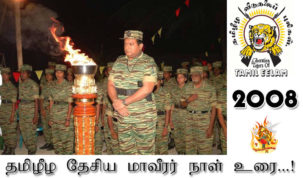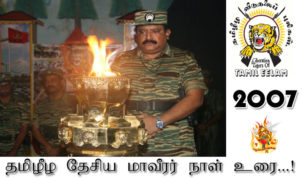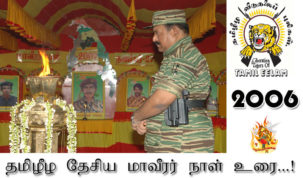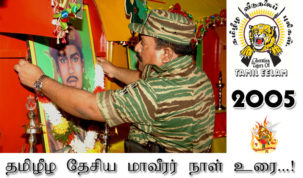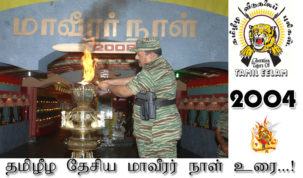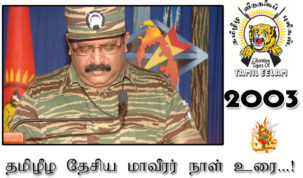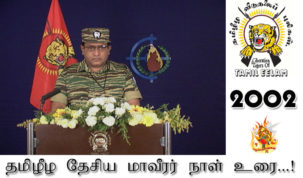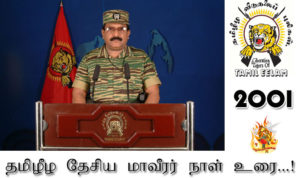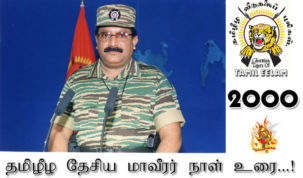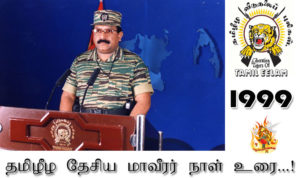ஈழத்தில் வர்க்கப் போராட்டம்
நூலாக்கம் (1989), நூல் நோக்கு (2021) : நூலாசிரியர் சுபா
ஈழத்தில் வர்க்கப் போராட்டம் என்ற இந்த ஆய்வுக் குறு நூல் 1989ம் ஆண்டு எழுதப்பட்டு, மலையகத் தோழர்களின் மகத்தான அர்ப்பணத்துடன், தலை மறைவு ரோனியோ பிரதியாகவும், பின்னால் இணைய பிரதியுமாக விநியோகத்துக்கு விடப்பட்டதாகும்.
ரோனியோ பிரதியை கொழும்பிலிருந்து யாழ்ப்பாணத்திற்கு கடத்திச் சென்று, தோழர் ரமணி இரகசியமாக யாழ் பல் கலை வட்டாரத்தில் விநியோகம் செய்தார்அதுவரைக்கும் `அன்னை பூபதி ஆக` இருந்த புலிகள் , இந்திய ஆக்கிரமிப்புப் படை வெளியேறியவுடன், `மண்டையன் குழு` ஆனார்கள்`!
தோழர் ரமணி கோரத்தனமாக சித்திரவதை செய்யப்பட்டு படுகொலை செய்யப்பட்டார்.பின்னால் ராஜீவ் கொலை இடம்பெற்றது.
கலைப்புவாதம் தலை தூக்கியது.
இந்த அரசியல், ஸ்தாபனச் சூழ்நிலையில், துரதிஸ்டவசமாக நெடுங்காலமாக இதை ஒரு நூலாக அச்சிடுவதற்கு வாய்ப்பு எட்டவில்லை.
1993இற்குப் பின்னால் அதற்கு வாய்ப்பு இருந்தது.முயற்சிகளும் எடுக்கப்பட்டது ஆனால், எட்டியிருந்தவர்களும், ஒட்டியிருந்தவர்களும், பந்தமென்று வந்தவர்களும், சொந்தம் என்று சொன்னவர்களும் ஆக எவருமே செய்யவில்லை!
எம் கொடியும் செய்யவில்லை, செங்கொடியும் செய்யவில்லை, 32 ஆண்டுகளாக!
காரணங்கள் எதுவாயினும், ஈழப்புரட்சி வரலாற்றில் இருட்டடிப்புச் செய்யப்பட்ட பல உண்மைகளில் இந்நூலும் ஒன்றாகும்.
இவ்வாறு இருட்டடிப்புச் செய்யப்பட்ட இவ் வரலாற்று ஆவணம், கடந்த 32 ஆண்டுகால குறிப்பாக முள்ளிவாய்க்காலுக்குப் பிந்திய, கடந்த 12 ஆண்டுகாலத்தின் முன் அறிவிப்பாகும்.
இன்று கற்போர் இந்த உண்மையை தெரிந்து கொள்ளவாவது முடியும்.
இந்நூல் எழுதப்பட்ட காலப் புலம் வருமாறு:
1987 இந்திய இலங்கை ஒப்பந்தத்தின், ஈழ அரசியல் இந்திய அடியாளாக இருந்தவர் திரு.அப்பாப்பிள்ளை அமிர்தலிங்கம்-இவர் வட்டுக்கோட்டை மேட்டுக் குடித் தமிழர் இராமநாதனுக்குப் பிந்திய இரண்டாம் தலை முறை ஆண்ட பரம்பரையினர்.
அமிர்தலிங்கம் ஒரு சதியின் மூலம் உரிமை கோராமல் கொலை செய்யப்பட்டார் 1989 ஜுலை 13 இல் இலங்கைத் தலை நகர் கொழும்பில்.
``அமிர்தலிங்கம் தமிழினத்துக்குச் செய்த துரோகத்தை பிரபாகரன் செய்தால் அவருக்கும் மரணதண்டனை தான்``, சொன்னவன் அண்ணன் பிரபாகரன்.கோராத உரிமை இது!
சுந்தரத்தில் இருந்து ரேகன், இந்திய உளவு நிறுவனம் `றோ` ஏவிவிட்ட, இயக்க மோதல்கள், உள்ளியக்கப் படுகொலைகள், இந்தியக் கைக் கூலி ரெலோ,ஈ.பி.ஆர்.ல்.எப், கந்தன் கருணை, 1987 இற்குப் பின்னால்
அமிர்தலிங்கம் என, அழித்தொழிப்பு முன்னேறி,`எங்கே போகிறோம்` எனக் கேள்வி எழுந்த வந்த சூழ் நிலையில், அந்தப் பாதையை ஆழமான ஒரு விசாரணைக்கு உட்படுத்த வேண்டிய அவசியம் ஏற்பட்டது.
எதிர்பார்த்தவாறு இப் பாதை உள் நாட்டிலிருந்து, அயல் நாட்டை எட்டியது. ராஜீவுக்கு மாலை சூட்டியது. கதிர்காமரின் கதை முடித்தது. மாத்தையா வையும் 600 தோழர்களையும் காணாமல் ஆக்கியது.இறுதியாக தோழர் ரமணியையும் கோரக்கொலை செய்தது.
அமிர்தலிங்கம் மற்றும் படுகொலைகள் ஆபத்தான பிரயத்தனமாகும். இது சர்வதேசிய பரிமாணம் கொண்டது. இப்போக்கு எமக்கு ``பயங்கரவாதிகள்`` எனப் பட்டம் சூட்டுவதற்கு ஏதுவாகிற்று. எமது விடுதலைப் போரின் நியாயத்தை மூடி மறைக்கவும்,எமது ஐக்கியத்தை சிதைக்கவும்,எமக்குள் ஊடுருவவும் எதிரிகளுக்கு உதவுவதாக ஆகிற்று.
பின்னைய விளைவுகளை நோக்குகின்றபோது, அமிர்தலிங்கம் கொலையை , அவரை ஒரு தனிமனிதனாக மட்டுமின்றி, அவரது வரலாற்றுப் பாத்திரத்தை, அதன் வர்க்கப் பின்னணியைக் கருத்தில் எடுத்து,
அழித்தொழிப்புப் பாதையை ஆழமான ஒரு விசாரணைக்கு உட்படுத்த வேண்டிய அவசியத்தை அன்று உணர்ந்து கொண்டது, அது வெல்லாது என அறைந்து கூறியது, வரலாற்று முக்கியத்துவமுடையதாகும்.
அப்போது இந்நூலாசிரியருக்கு வயது 32. அரசியல் மற்றும் ஆய்வு முதிர்ச்சி இன்மையின் அநேக அடையாளங்களை இந் நூலில் இன்று நாம் கண்டுபிடிக்க முடியும். எனினும் அவற்றை இன்று திருத்த முடியாது.
அது நூலின் ஆன்மாவை அழித்துவிடும். (அதிக பட்சம் பின் இணைப்பு செய்யலாம்.அதற்கு இங்கே சிறிதளவில் முயற்சிக்கப்படுகின்றது.)
இந் நூலின் ஆழம் 1960, 1970, 1980 களின் சர்வதேச சூழ்நிலையைக் கவனத்தில் கொள்ளாத-அந்த பார்வை இல்லாத-அறியாமையைக் கொண்டிருக்கின்றது என்பதும்,மற்றும் பலவும், இன்றைக்கு தெரிகின்ற உண்மை.இதை ஈடு செய்ய முடியும். இட்டு நிரப்பவும் முடியும்.இன்றும் இனி வருங்காலத்திலும்!
1989 இக்குறு நூலின் இறுதி இரண்டு பந்திகளில் முதல் பந்தி பிரகடனம் செய்திருப்பது, பின்வருமாறு:``தமிழ்த்தரகு முதலாளிய வர்க்கம் மூன்று எதிர்ப்புரட்சிக் கோட்பாடுகளின் அடிப்படையில் தான், தமிழ் மக்கள் மத்தியில் இன்னும் உயிர் வாழ்ந்து கொண்டிருக்கின்றது. இக்கோட்பாடுகளில் இருந்து தமிழ் மக்களை விடுவிக்காத வரையில் ஒரு வர்க்கம் என்கிற முறையில் அதன் எதிர்ப்புரட்சிப் பாத்திரத்தை எந்தத் துப்பாக்கியும் எதுவும் செய்துவிடாது.``
ஆனையிறவு பெரும் ஆக்கிரமிப்பு படைத்தள தகர்ப்புக்குப் பின்னால் ஆண்ட பரம்பரை மீண்டும் ,பாராளமன்றப் பாடையேறி போர்க்களமாடி ஆள நினைத்ததும், புலம்பெயர் தமிழன் பொங்கு தமிழ் `தாயகம் தேசியம் தன்னாட்சி` பேசியதும், இருபது ஆண்டுகள் கழித்து 2009 இல் ஆயுதம் மெளனித்ததும், ஆனந்தபுரத்தில் இந்திய மாதா விச வாயு அடித்து மாண்டதும், நந்திக்கடலை நீந்தியதும் , முள்ளிவாய்க்காலில் இறுதியாக மூர்ச்சை உற்றதும், ஐ.நா வுக்கு காவடி எடுத்ததும், அத்தனை ஆண்ட பரம்பரையும் இந்திய மாநில உலக மறு பங்கீட்டு சமஸ்டி அமைக்க ஒன்று சேருவதும் இவ்வாறு தான் நடந்தேறியது! இந்த அடிப்படையில் தான் நடந்தேறுகின்றது.
காரணம் போலிப் புலிப் பினாமிகளும் அவர்களது புலம் பெயர் வாரிசுகளும், மாவீரர்களுக்கு துரோகம் செய்து, மாபெரும் விவசாயப் படையை நிர்மூலமாக்கி, `தாயகம் தேசியம் தன்னாட்சி` சமரச முழக்கத்தை சாதகமாக்கி , அதையும் இழி நிலைக்கு தள்ளி- அரசியல் நடத்துவது தான்!
இந்த `தமிழ்த் தேசிய அரசியல்`
1) குறுமின மற்றும் இனத்துவ வாதம்
2) சமரச சமஸ்டிவாதம்
3) பாராளமன்ற சட்டவாதம்
என்கிற அத்திவாரத்தில் கட்டப்பட்டு, மேலதிகமாக 2009 இற்குப் பின்னால்,
4) போர்க்குற்ற நீதி
5) உலக மறுபங்கீட்டுக்கு உகந்த `அரசியல் தீர்வு``
6) அந்நிய இராணுவத் தலையீடு
7) என அமெரிக்க-ஐரோப்பிய-இந்திய முகாமோடு அணிசேர்ந்துள்ளது.
இந்த அரசியல் போக்குக் பின்னால் இருக்கின்ற சமூக வர்க்கம் தமிழ்த் தரகு முதலாளித்துவவும், குட்டி நிலப்பிரபுத்துவ-முதலாளித்துவமுமாகும் ஆகும்.
இலங்கையில் ஈழ தேச ஒடுக்குமுறையை (இயங்கியல் பொருள்முதல்வாத) வர்க்கப் பார்வை இன்றி, (கருத்து முதல்வாத) இனத்துவ மாயையில் நோக்கி வரும் வரையில் அத் தேசம் தனது விடுதலையை ஒரு போதும் அடையாது.
ஏனெனில் 1950 களில் இக்கோட்பாடுகள் அமுலாக்கப்படுவதற்கான குறிக்கோள்களும், வடிவங்களும், தன்மைகளும் அக்காலத்தின் தேவைக்குரியவை. இன்று இக்காலத்துக்குரிய வடிவத்தை எடுத்துள்ளன.இக்குறிப்பான தன்மையை , அடிப்படை வேறுபாட்டை இனங்காண்பது ஒரு உயிர்த்துடிப்புள்ள அரசியல் இயக்கத்துக்கு மிக மிக இன்றியமையாதது. 32 ஆண்டுகளுக்கு முன்னால் எழுதப்பட்ட
இந்நூலுக்கு இன்று ஒரு அறிமுகவுரை எழுதும் போது இக்காலத்துக்கும், அக்காலத்துக்கும் உள்ள இயங்கியல் இணைப்பை,அதன் வளர்ச்சியின் மாறிய மற்றும் மாறாத அம்சங்களை-தொப்புள்கொடி உறவை-
ஆய்வு செய்து பதிவு செய்வதே எனது சிந்தனையாகவுள்ளது.
மீண்டும் பழைமைக்குள் நுழைவோம்!
1950-1960 களின் புறச்சூழலில் தான் ( இத் தசாப்தத்தில் )- தொடர்காலனிய நாடான இலங்கையில் தேசிய இனப்பிரச்சினை கூர்மையடைந்தது. புகழ் போர்த்த `சத்தியாக்கிரகம்` 1961 இல் தான் நடந்தது. .குடியுரிமை பறிக்கப்பட்டதன் பின்னால் முதல் தடவையாக 05-08-1960 இல் தொண்டமான் சட்டமன்ற உறுப்பினராக தெரிவு செய்யப்பட்டார். Dr Badi-ud-din Mahmud , He was a Sri Lankan politician. He served 10 years [(23 July
1960 – 28 May 1963) and (31 May 1970 – 23 July 1977)] as Minister of Education and also held the office of Minister of Health and Housing.இவருடைய பதவிக்காலம் இலங்கைச் சோனகரின் பொற்காலமாகும்.
இவ்வாறு சட்டமன்றத்தை மையப்படுத்திய அரசதிகார போட்டியில் ஆளும் வர்க்கப் பிரிவுகள் ஈடுபட்டுக்கொண்டிருந்த கொந்தழிப்பான அரசியல் சூழலில் சண்முகதாசன் சாதிப் போராட்டம் நடத்திக் கொண்டிருந்தார்.
இதை அவர் ``அறியாமல் செய்திருப்பார்`` என்பதை ஏற்க அறிவு மறுக்கின்றது. ஆதாரங்களும் மறுக்கின்றன.ஏகாதிபத்திய, சிங்கள ஆளும் தரகு வர்க்க நலனுக்கு ஈழ தேசிய உழைக்கும் மக்களை அடிபணிய வைத்த இரண்டு வாள்கள், ஓன்று அமிரின் குறுமினவாதம்! இரண்டு சண்ணின் சாதியவாதம்.
இலங்கையில் ஏகாதிபத்திய எதிர்ப்பு தேசிய ஜனநாயக விடுதலைப் புரட்சி மூன்று திட்டமிட்ட சதிகளால் முறியடிக்கப்பட்டது.
1) ரொட்ஸ்கியவாதம்.
2) தமிழ்த் தரகு பிரபுத்துவ வர்க்கத்தின் `குறுமினவாதம்`
3) சண்முகதாசனின் சாதியவாதம்.
இக்கையறு நிலையில் சமஸ்டி இயக்கம் பூத்துக்குலுங்கியது.
தத்துவார்த்த அரசியல் தலைமை வெறுமை,வறுமை நிலவிய காலம் அது.
இக்காலப்பகுதியில் தான் தமிழ் இளைஞர் பேரவையில் பிளவு ஏற்பட்டது. ( யோகேஸ்வரன் யாழ் வீட்டில் நடந்த கூட்டத்தில் இம்முடிவு எடுக்கப்பட்டது.) பிரிந்து சென்றவர்கள் ஈழ விடுதலை இயக்கம் என தமக்கு பெயர் சூடினர்.ஈழப்புரட்சி வரலாற்றில் `விடுதலை` என்கிற பதம் முதன் முதலாகப் பயன்படுத்தப்பட்டது. இதற்கு முன்னால் அது `உரிமை` ஆக இருந்தது.இந்த விடுதலை, பாலஸ்தீன மற்றும் அயர்லாந்து தேசவிடுதலை இயக்கங்களின் பாதிப்பில் இருந்து விளைந்ததாகும். இதன் பின்னர் தான் தமிழர் கூட்டணி தனது பெயர் தமிழர் விடுதலைக்கூட்டணி ஆக்கிக் கொண்டது.
ஈழதேசிய வரலாற்றில் இருட்டடிப்புச் செய்யப்பட்ட `பொன் தீவு கண்டல் மாநாடு` நடைபெற்றது.
இம்மாநாட்டில் ஈழ விடுதலை இயக்கம் தனது கொள்கைப் பிரகடனத்தை வெளியிட்டது.
1) தமிழர் கூட்டணியின் இளைஞர் அமைப்பாக இருப்பதில்லை.
2) தேர்தலில் பங்கேற்பதில்லை.
3) ஆண்டபரம்பரை மீண்டும் ஆள தனித் தமிழீழ நாடு அமைப்பது.
4) நாடு தழுவிய வகையில் தமிமீழப் பிரச்சாரம் செய்வது.
5) ஈழ விடுதலை இயக்கத்தை பலம் வாய்ந்த இளைஞர் அமைப்பாகக் கட்டியமைப்பது.
6) ஏரும் ஈட்டியும் சின்னமாகத் தேர்ந்தெடுக்கப்பட்டது.
சுயநிர்ணய உரிமை, ஆயுதப் போராட்டம் குறித்த பிரச்சனை அம்மாநாட்டில் எழவில்லை.
ஒரு முறையான ஸ்தாபன வடிவமும் உருவாக்கப்படவில்லை.
இத்தனையும் கனிந்த சூழலில் தான், வேறு வழியில்லாமல் கூட்டணி வட்டுக்கோட்டைத் தீர்மானத்தை நிறைவேற்றி 1977 தேர்தலைப் பொது வாக்கெடுப்பாக அறிவித்தது.ஈழ விடுதலை இயக்கம் முழு மூச்சாக தேர்தல் பிரச்சாரத்தில் இறங்கியது.
இத்தேர்தலில் பங்கெடுத்துக் கொண்டது தொடர்பான கருத்து முரண்பாடு, தேசிய இனப்பிரச்சனைக்கான திட்டமின்மை, முறையான ஸ்தாபன வடிவம் இன்மை, குட்டிமுதலாளிய ஊசலாட்டம் போன்ற காரணங்களால் இந்த அமைப்பு கலைந்து போனது.
(பலர் வெவ்வேறு போராட்ட அமைப்புகளில் இணைந்து கொண்டனர்.சிலர் வெளி நாடு சென்றனர்.வேறு சிலர் பெட்டிக்கடை சிறு வர்த்தகர் ஆகினர்.இப்போக்கின் தத்துவ ஆசிரியர் பின்னாளில் முதலமைச்சரானார்.இம்மாநாட்டின் ஏற்பாட்டாளர் தமிழீழ விடுதலைக்கு தனிப்படை கட்டியபோது புலிகளால் கைது செய்யப்பட்டு கேர்ணல் கிட்டுவால் படுகொலை செய்யப்பட்டார் (1987 ஐ ஒட்டி)).
ஈழ மாணவர் இயக்கம் தோன்றியது. அது கூட்டணியின் நாடாளமன்ற சந்தர்ப்பவாதத்தை பட்டி தொட்டியெங்கும் தோலுரித்துப்போட்டது, இத்தனை பாதையும் ஒரு நீண்ட நெடிய அரசியல் போராட்டத்தில் தயார் செய்யப்பட்டுவிட்டிருந்த சூழலில் தான், பிரபாகரனின் தமிழீழ விடுதலைப்புலிகள் அமைப்பு கருத்தரித்து 1976 இல் பிரகடனப்படுத்தப்பட்டது. வீரம் செறிந்த தமிழீழ விடுதலைக்கான ஆயுதப் போராட்டத்தை அப்பழுக்கற்ற தியாகத்தோடு முன்னெடுத்தது.2002 பேச்சுவார்த்தையில் அங்கீகாரத்துக்கு ஆசைப்பட்டு தன்னைத் தானே அழித்துக்கொண்டது.
1)
1960-70 பத்தாண்டு காலம் உலகவரலாற்றில் முக்கியமான தசாப்தமாகும். இது அதற்கு முந்திய, பிந்திய இருபத்தாண்டுகளின் முன்னும் பின்னுமான சங்கிலிப் பிணைப்பைக் கொண்டது. மொத்தம் இது ஒரு முப்பது ஆண்டுகள். உலக முதலாளித்துவம் பெரும் நெருக்கடியைச்சந்தித்துக்கொண்டிருந்தது. 1960-1970 அமெரிக்காவில் பொருளாதார மந்தம் நீடித்த 10 ஆண்டுகள் ஆகும்.
1949 இல் வெற்றி வாகை சூடிய மக்கள் சீனம் 1960 இல் -பாட்டாளிவர்க்க சர்வாதிகார- கலாச்சாரப்புரட்சி நடத்திக்கொண்டிருந்தது. வியட்நாம் அமெரிக்க எதிர்ப்பு தேசபக்த யுத்தத்தில் குதித்திருந்தது.
இந்தியாவில் தோழர் சாருவின் வசந்தத்தின் இடிமுழக்கம் நக்சல்பாரி-உழுபனுக்கு நிலம்-ஆயுதம் ஏந்திய விவசாய கிளர்ச்சி வெடித்திருந்தது.
உலக முதலாளித்துவ நெருக்கடியை எதிர்த்த போராட்டங்கள் மேலை நாடுகளில் பரந்துவிரிந்தன.
பிரித்தானியாவை உலுக்கிய 10 ஆண்டுகளாக வரலாற்றில் இத் தசாப்தம் பதியப்பட்டுள்ளது. அமெரிக்காவில் கருந்தேசியக் கிளர்ச்சி சுவாலை விட்டு எரிந்தது.
வியட்நாம் போர் எதிர்ப்பு முழக்கங்கள் உலகெங்கும் விண்ணதிர ஒலித்துக் கொண்டிருந்தன.
1953இல் ஸ்ராலின் இறந்தார்.அதுவரை ஏகாதிபத்திய உலகத்துக்கு சிம்ம சொர்ப்பனமாய் இருந்தார்.
அதுவரைக்கும் உலகம் ஏகாதிபத்தியம்-சோசலிஸம் என இரு முகாம்களாக இருந்தது.
மொஸ்கோ அயல் மொழிப் பதிப்பகம், சீன மக்கள் குடியரசு மார்க்சிய லெனினிய நூல்களை எண்ணற்ற தாய்மொழிகளில் அச்சிட்டு `உலகமெல்லாம் பரவ வகை` செய்தது.
சுருங்கச் சொன்னால் மேலைக் காற்றும், கீழைக்காற்றும் ஒரு சேர வீசியது.
ஒருபுறம் ஏகாதிபத்திய எதிர்ப்பு-தேசிய-இயக்கங்கள் எழுந்தது, மறு புறம் மார்க்சியம் பரவியது.பஞ்சும் நெருப்பும் அக்கம் பக்கமாக இருந்தன.எப்பேற்பட்ட பயங்கரம்!
இதிலிருந்து தம்மை தற்காத்துக்கொள்ள ஒரு `சமரச மார்க்கம்` -சித்தாந்தம், சிந்தனைப்போக்கு-அவர்களுக்கு அவசியப்பட்டது.
அதை ஈடு செய்தது இந்த ``அரை நிர்வாணப் பக்கிரி`` ஆபிரிக்க வக்கீல் காந்தி. இந்த அகிம்சை காலனி நாடுகள் எங்கும் பரவியது. செல்வநாயகம் ஈழத்துக் காந்தியானார்!
ஸ்ராலினிற்குப் பின்னால் சோவியத் யூனியன் குருச்சேர்வ் திருத்தல்வாத பாதையில் சமூக ஏகாதிபத்தியமாக உருமாறிற்று.
இப்போது உலகம் ஏகாதிபத்தியம்-சமூக ஏகாதிபத்தியம் என இரு முகாம்களாக இருந்தது. கோர்ப்பசேவ் நாட்கள் வரைக்கும் இது நீடித்தது.
2)
போலந்தில் பெரிய பாதிரியார் ஆரம்பித்து வைத்து, , ரசிய சமூக ஏகாதிபத்தியத்தின், ``கொம்யூனிசத்தின்`` வீழ்ச்சிக்குப் பின்னால், பெர்லின் சுவர் தகர்ப்புடன் குதித்துக் கொண்டாடி அமெரிக்கா தலைமையிலான ஒற்றைத் துருவ உலக ஒழுங்கமைப்பு ஏற்பட்டது.
முன்னாள் சோவியத் ஒன்றிய கிழக்கைரோப்பிய -போல்கன் நாடுகள், மேற்கரோப்பிய முகாமில் இணைந்து படிப்படியாக `ஐரோப்பியன் ஜூனியனில்` சங்கமித்தன.
அதீத ஆசையில் அமெரிக்கா மத்திய கிழக்கை கபளீகரம் செய்ய சாக்குப் போக்குகள் சொல்லி போர் மூட்டியது.
ஆப்கான்,ஈராக்,லிபியா,சிரியா அத்தனையும் படு தோல்வியில் முடிந்தது.
அமெரிக்கா தனது உலக மறுபங்கீட்டு பிராந்திய யுத்தத்தை மத்திய (ஆசியாவில்) கிழக்கில் இருந்து `ஆசிய பசுபிக் பிராந்தியத்துக்கு ` மாற்றியுள்ளது.;
உலகில் அமெரிக்காவின் ஒற்றை ஆதிக்கம் ஆப்கானில் இருந்து அவமானகரமாக வெளியேறிய போது முற்றாக முடிவுக்கு வந்தது. அமெரிக்கா தனது உலக மேலாதிக்கத் தலைமையை இழந்தது.
(இந்த மாற்றம் சீன ஏகாதிபத்தியத்தை குறி வைத்ததாகும்.)
இந்த இடைக்காலத்தில் தான் இரண்டு ஏகாதிபத்தியங்கள் ஆசியாவில் உருவாகின.
ஒன்று சீனா, மற்றது ரசியா.
3)
மீண்டும் இரு துருவ உலக ஒழுங்கு உருவாகியுள்ளது.
எண்ணெய், எரிவாயு,ஆயுதம் கொண்ட பொருளாதார பலத்தாலும், சோவியத் யூனியனில் இருந்து பிரிக்கப்பட்ட கிழக்கு ஐரோப்பிய நாடுகள் மீதான ஆதிக்கத்தாலும், உள்நாட்டில் பாசிச பலத்தாலும், ரசிய ஏகாதிபத்தியம் உலக மறுபங்கீட்டுப் போட்டியில் குதித்துள்ளது.
அபரிமிதமான நிதி மூலதன வலிமையாலும், நவீன இராணுவப் பெருக்க வல்லமையாலும், உள்நாட்டில் பாசிச பலத்தாலும், சீன ஏகாதிபத்தியம் உலக மேலாதிக்கப் போட்டியில் குதித்துள்ளது.
இவ்வாறு அமெரிக்காவை எதிர்த்த சீன ரசிய முகாம் உருவாகிவிட்டது.
அமெரிக்க ஐரோப்பிய உறவுகள் திடப்படாத நிலையில் உள்ளன. அமெரிக்க இங்கிலாந்துக் கூட்டுக்கும், பிரான்ஸ் - ஜேர்மனி கூட்டுக்கும் இடையே முரண்பாடுகள் வெளிப்படையாகின்றன. இது NATO உறவிலும் வெடிப்புக்களைக் காட்டுகின்றது.
அமெரிக்க முனைப்பிலான, ஆப்கான்,ஈராக்,லிபியா,சிரியா அத்தனையும் படு தோல்வியில் முடிந்தது.இந்நாடுகளில் எல்லாம் ரசிய சீன ஈரான் ஆதிக்கம் மறு பங்கீடு கொண்டுள்ளது.
இவ்வாறு ஆக்கிரமிப்புப் போர்களாகவும், அமைதியான பங்கீடுகளாகவும், ஆட்சிக்கவிழ்ப்பு தலையீடுகளாகவும் ஒரு உலக மறுபங்கீட்டு பனிப்போர் சூழல்- (உலகப் போருக்கான முன் தயாரிப்பு) - தோன்றி ஒரு போக்காகி -உலகின் பிரதான முரண்பாடாகிவிட்டது.
4)
ஆக இந்த மாறுபட்ட உலக ஒழுங்கமைப்பின் விதிகளுக்கு உட்பட்டுத்தான் இன்று ஈழ தேசிய இனப் பிரச்சனை- இலங்கையின் பிராதான முரண்பாடு இயங்குகின்றது.அது எவ்வாறெனில் மத்திய ஆசிய ஆக்கிரமிப்பில் தோல்வியுற்ற அமெரிக்கா , சீன முன்னேற்றத்தைத் தடுப்பதற்காக, இந்தோ பசுபிக் பிராந்தியத்துக்கு தன்னை நகர்த்திக் கொண்டுள்ளது. இதன் பகுதியாக ஈழ தேசிய இனப் பிரச்சனை மாறிவிட்டது..
5)
மேலும் இக்காலப் பகுதியில் தான் இந்திய விரிவாதிக்க அரசு தன்னை மேலும் பாசிசமயமாக்கியது, காஸ்மீரை கபளீகரம் செய்தது, மோடிப்பாசிசம் உருவானது. இந்துத்துவா என்கிற மத முகமூடி தரித்த விரிவாதிக்கப் பாசிசம் தன்னை நிலை நிறுத்திக் கொண்டது. இது உலக மறு பங்கீட்டில் அமெரிக்க அணி சேர்ந்தது.
6)
இதே காலத்தில் தான் பக்ச பாசிசம் ஏகச்சிங்கள வாக்குப் பெரும்பான்மையில் இலங்கையில் இராணுவ சர்வாதிகார பாசிச அரசை, நாடாளமன்றத் திரையின் பின்னால் கட்டியமைத்தது.
7)
இது சீனாவோடு -உலக மறுபங்கீட்டு கூட்டமைக்க விழைகின்றது.
8)
இவ்வாறு ஈழ தேசிய இனப்பிரச்சனை உலக மறுகீட்டின் ஒரு பகுதியாகிவிட்டது. இது 1983 இல்,1987இல், 2002இல் இல்லாத ஒரு புதிய சூழலும் திருப்பமும் ஆகும்.
இந்திய விரிவாதிக்கம் 1983 இல் தலையிட்டபோது தமிழரைக் காப்போம் என்றது. 1987 இல் தலையிட்டபோது தமிழரையும் இலங்கையின் இறைமையையும் ஒரு சேரக் காப்போம் என்றது.இன்று 2021 இல் மாகாண சபைத் திட்டத்தை அமூலாக்குவோம் என்கிறது!
9)
இந்திய விரிவாதிக்கம் கூறும் இந்த வடக்கு, அல்லது வடகிழக்கு மாகாணசபை என்பது,வடிவம் எவ்வாறு அமையினும் இந்தியாவின் மற்றொரு அடிமை மாநிலமே ஆகும்.உலக மறு பங்கீட்டின் இந்தியத் தளம் ஆகும்.
10)
இதற்கான தயாரிப்புகள் ஆரம்பமாகிவிட்டன.
மீண்டும் அந்நியத் தலையீட்டுக்கு அழைப்பு விடுகின்றன, இலங்கை+புலம் பெயர் `தமிழ்க் கட்சிகள்`. இந்தத் தடவை இது அமெரிக்க இந்திய கூட்டுத் தலையீடாகும்.அமெரிக்கா தமிழ் மக்களோடு ``பயணிக்க`` போவதாக அறிவித்துள்ளது.மேலும் ஒரு படி சென்று NATO இராணுவத் தலையீடு வரை செல்கின்றது இந்த அந்நியத் தலையீட்டு அழைப்பு . மலையகம்,சோனகம், (இலங்கைத்) தமிழகம் இணைந்த ஈழ தேசத்தை மத வழியிலும்,பிரதேச வழியிலும் பிளவுபடுத்த முயற்சிக்கப்படுகின்றது.கத்தோலிக்க பாதிரிகள் இதற்கு திருத் தொண்டு ஆற்றுகின்றனர்.(இலங்கைத்) தமிழகத்தில் பா.ஜ.க கட்டப்படுகின்றது.வர்த்தக
உடன்படிக்கைகளை சீனாவுடன் அல்லாமல் இந்தியாவுடன் செய்ய வேண்டும் எனக்கோரப்படுகின்றது.
ஆக இந்தச் சித்திரத்தில் அப்பாப்பிள்ளை அமிர்தலிங்கம் உயிர்த்தெழுந்து நிற்பதையே காண்கின்றீர்கள்.
இதைத்தான் இவ் ஆய்வு 32 ஆண்டுகளுக்கு முன்னால் எதிர்வு கூறியது.
இது போன்ற ஆய்வுகளுக்கு முன்னோடியான முதல் ஆய்வும் முதல் நூலும் இன்று வரைக்கும் இதுவே ஆகும்.
இறுதி வெற்றி ஈழமக்களுக்கே!
படியுங்கள்! பரப்புங்கள்!
சுபா 30-11-2011


















